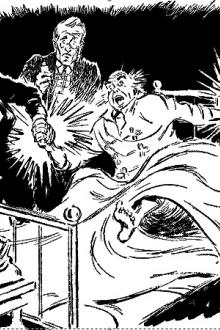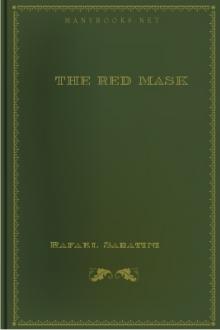The Face and the Mask - Robert Barr (comprehension books TXT) 📗

- Author: Robert Barr
Book online «The Face and the Mask - Robert Barr (comprehension books TXT) 📗». Author Robert Barr
Firing had ceased for some minutes before he noticed the fact. A bank of thinning smoke rested on the water between the buoy and the ships. He saw the ironclads move ponderously around and steam through this bank turning broadside on again in one, two, three, order. He watched the evolution with his chin resting on his hands, not realizing that the moment for signalling had come. When the idea penetrated his somewhat dazed mind, he sprang to his feet, but his opportunity had gone. The smoke of the first gun rose in the air, there was a clang of iron on iron, and De Plonville found himself whirling in space: then sinking in the sea. Coming breathless to the surface, he saw the buoy revolving slowly, and a deep dinge in its side seemed to slide over its top and disappear into the water, showing where the shot had struck. The second boat did not fire, and he knew that they were examining the buoy with their glasses. He swam around to the other side, intending to catch a ring and have it haul him up where he could be seen. Before he reached the place the buoy was at rest again, and as he laboriously climbed on top more dead than alive, the second ship opened fire. He lay down at full length exhausted, and hoped if they were going to hit they would hit quick. Life was not worth having on these conditions. He felt the hot sun on his back, and listened dreamily to the cannon. Hope was gone, and he wondered at himself for feeling a remote rather than an active interest in his fate. He thought of himself as somebody else, and felt a vague impersonal pity. He criticised the random firing, and suspected the hit was merely a fluke. When his back was dry he rolled lazily over and lay gazing up at the cloudless sky. For greater comfort he placed his hands beneath his head. The sky faded, and a moment's unconsciousness intervened.
"This won't do," he cried, shaking himself. "If I fall asleep I shall roll off."
He sat up again, his joints stiff with his immersion, and watched the distant ironclads. He saw with languid interest a ball strike the water, take a new flight, and plunge into the sea far to the right. He thought that the vagaries of cannon-balls at sea would make an interesting study.
"Are you injured?" cried a clear voice behind him.
"Mon Dieu!" shouted the young man in a genuine fright, as he sprang to his feet.
"Oh, I beg pardon," as if a rescuer need apologize, "I thought you were M. De Plonville."
"I am De Plonville."
"Your hair is grey," she said in an awed whisper; then added, "and no wonder."
"Mademoiselle," replied the stricken young man, placing his hand on his heart, "it is needless to deny--I do not deny--that I was frightened-- but--I did not think--not so much as that, I regret. It is so--so-- theatrical--I am deeply sorrowful."
"Please say no more, but come quickly. Can you come down? Step exactly in the middle of the canoe. Be careful--it is easily upset--and sit down at once. That was very nicely done."
"Mademoiselle, allow me at least to row the boat."
"It is paddling, and you do not understand it. I do. Please do not speak until we are out of range. I am horribly frightened."
"You are very, very brave."
"Hs--s--sh."
Miss Stansby wielded the double-bladed paddle in a way a Red Indian might have envied. Once she uttered a little feminine shriek as a cannon ball plunged into the water behind them; but as they got further away from the buoy those on the iron-clads appeared to notice that a boat was within range, and the firing ceased.
Miss Stansby looked fixedly at the solemn young man sitting before her; then placed her paddle across the canoe, bent over it, and laughed. De Plonville saw the reaction had come. He said sympathetically:--
"Ah, Mademoiselle, do not, I beg. All danger is over, I think."
"I am not frightened, don't think it," she cried, flashing a look of defiance at him, and forgetting her admission of fear a moment before. "My father was an Admiral. I am laughing at my mistake. It is salt."
"What is?" asked her astonished passenger.
"In your hair."
He ran his fingers through his hair, and the salt rattled down to the bottom of the canoe. There was something of relief in his laugh.
* * * * *
De Plonville always believes the officers on board the gunboats recognized him. When it was known in Paris that he was to be married to the daughter of an English Admiral, whom rumor said he had bravely saved from imminent peril, the army lieutenant remarked that she could never have heard him speak her language--which, as we know, is not true.
A NEW EXPLOSIVE.
The French Minister of War sat in his very comfortable chair in his own private yet official room, and pondered over a letter he had received. Being Minister of War, he was naturally the most mild, the most humane, and least quarrelsome man in the Cabinet. A Minister of War receives many letters that, as a matter of course, he throws into his waste basket, but this particular communication had somehow managed to rivet his attention. When a man becomes Minister of War he learns for the first time that apparently the great majority of mankind are engaged in the manufacture or invention of rifles, gunpowders, and devices of all kinds for the destruction of the rest of the world.
That morning, the Minister of War had received a letter which announced to him that the writer of it had invented an explosive so terrible that all known destructive agencies paled before it. As a Frenchman, he made the first offer of his discovery to the French Government. It would cost the Minister nothing, he said, to make a test which would corroborate his amazing claims for the substance, and the moment that test was made, any intelligent man would recognize the fact that the country which possessed the secret of this destructive compound would at once occupy an unassailable position in a contentious world.
The writer offered personally to convince the Minister of the truth of his assertions, provided they could go to some remote spot where the results of the explosion would do no damage, and where they would be safe from espionage. The writer went on very frankly to say that if the Minister consulted with the agents of the police, they would at once see in this invitation a trap for the probable assassination of the Minister. But the inventor claimed that the Minister's own good sense should show him that his death was desired by none. He was but newly appointed, and had not yet had time to make enemies. France was at peace with all the world, and this happened before the time of the Anarchist demonstrations in Paris. It was but right, the letter went on, that the Minister should have some guarantee as to the bona fides of the inventor. He therefore gave his name and address, and said if the Minister made inquiries from the police, he would find nothing stood in their books against him. He was a student, whose attention, for years, had been given to the subject of explosives. To further show that he was entirely unselfish in this matter, he added that he had no desire to enrich himself by his discovery. He had a private income quite sufficient for his needs, and he intended to give, and not to sell, his secret to France. The only proviso he made was that his name should be linked with this terrible compound, which he maintained would secure universal peace to the world, for, after its qualities were known, no nation would dare to fight with another. The sole ambition of the inventor, said the letter in conclusion, was to place his name high in the list of celebrated French scientists. If, however, the Minister refused to treat with him he would go to other Governments until his invention was taken up, but the Government which secured it would at once occupy the leading position among nations. He entreated the Minister, therefore, for the sake of his country, to make at least one test of the compound.
It was, as I have said, before the time of the Paris explosions, and ministers were not so suspicious then as they are now. The Minister made inquiries regarding the scientist, who lived in a little suburb of Paris, and found that there was nothing against him on the books of the police. Inquiry showed that all he had said about his own private fortune was true. The Minister therefore wrote to the inventor, and named an hour at which he would receive him in his private office.
The hour and the man arrived together. The Minister had had some slight doubts regarding his sanity, but the letter had been so straightforwardly written, and the appearance of the man himself was so kindly and benevolent and intelligent that the doubts of the official vanished.
"I beg you to be seated," said the Minister. "We are entirely alone, and nothing you say will be heard by any one but myself."
"I thank you, Monsieur le Ministre," replied the inventor, "for this mark of confidence; for I am afraid the claims I made in the letter were so extraordinary that you might well have hesitated about granting me an interview."
The Minister smiled. "I understand," he said, "the enthusiasm of an inventor for his latest triumph, and I was enabled thus to take, as it were, some discount from your statements, although I doubt not that you have discovered something that may be of benefit to the War Department."
The inventor hesitated, looking seriously at the great official before him.
"From what you say," he began at last, "I am rather afraid that my letter misled you, for, fearing it would not be credited I was obliged to make my claims so mild that I erred in under-estimating rather than in over-stating them. I have the explosive here in my pocket."
"Ah!" cried the Minister, a shade of pallor coming over his countenance, as he pushed back his chair. "I thought I stated in my note that you were not to bring it."
"Forgive me for not obeying. It is perfectly harmless while in this state. This is one of the peculiarities--a beneficent peculiarity if I may so term it--of this terrible agent. It may be handled with perfect safety, and yet its effects are as inevitable as death," saying which, he took out of his pocket and held up to the light a bottle filled with a clear colorless liquid like water.
"You could pour that on the fire," he said, "with no other effect than to put out the blaze. You might place it under a steam hammer and crush the bottle to powder, yet no explosion would follow. It is as harmless as water in its present condition."
"How, then," said the Minister, "do you deal with it?"
Again the man hesitated.
"I am almost afraid to tell you," he said; "and if I could





Comments (0)